General
Ambassador Arikana Chihombori tasks African Youth Leaders to re-unite Africa
Published
3 years agoon
By
Mak Editor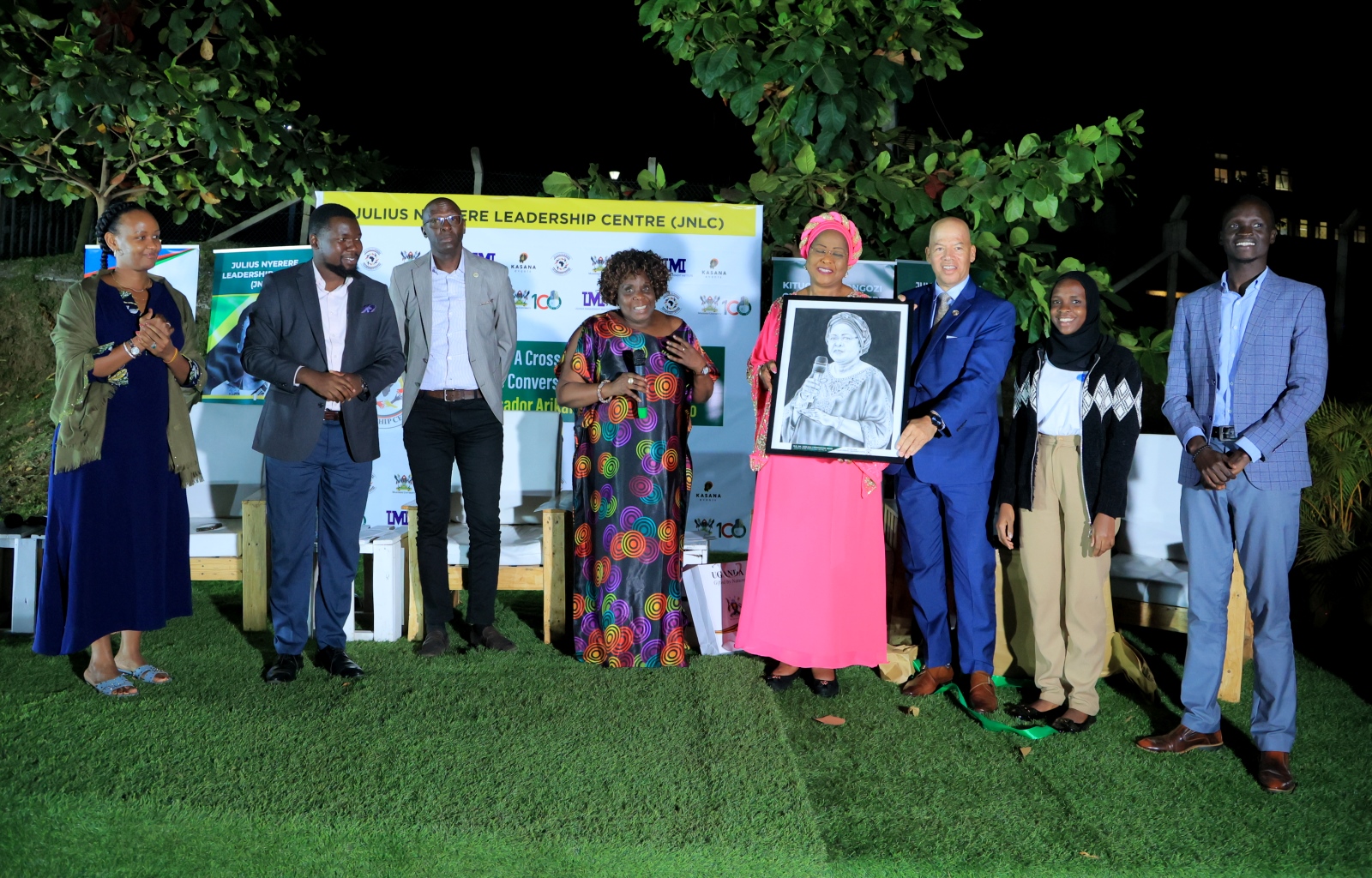
By Ritah Namisango
“We are at war-an economic war; we are also at war with our own mind. Wake up Africa, have a conversation with the image in the mirror and what you believe. We have to continuously and constantly remind ourselves that we have this ailment and we were programmed to feel inferior. That is the part of mind and a continuous battle. You and the image in the mirror are the only ones who can decide whether it is a battle that you are determined to win,” H.E Ambassador Dr. Arikana Chihombori Quao tasked the youth and student leaders at a cross-generational Fireside Conversation (Ekyooto) organized by Julius Nyerere Leadership Centre (JNLC) at Makerere University on July 26th 2023.
The Julius Nyerere Leadership Centre (JNLC) is named after a great Pan-Africanist and former President of the United Republic of Tanzania, the late Mwalimu Julius Kambarage Nyerere. The Centre, established as a Presidential Initiative, was launched on October 6th 2018 to honor his legacy as a true African leader and activist. The Centre was expected to spearhead intergenerational dialogues on African history and the study of Africa’s revolutionary movements. As a knowledge and research hub, the Centre was to provide a platform for distinguished African intellectuals, scholars and other accomplished Africans to share, nurture, mentor, challenge and account to the next generation of African leaders.
Delivering the keynote speech, H.E. Ambassador Dr. Arikana Chihombori-Quao reflected on the past ideas and current leaders’ ideals to build Africa’s self-sustenance. While sharing with the vibrant young minds at ‘Ekyooto’ about the gift of the African Continent, the Ambassador emphasised the need to go back to the genesis and root of why Africa is where it is today. In her view, we can never know where we are going if we don’t know where we come from.
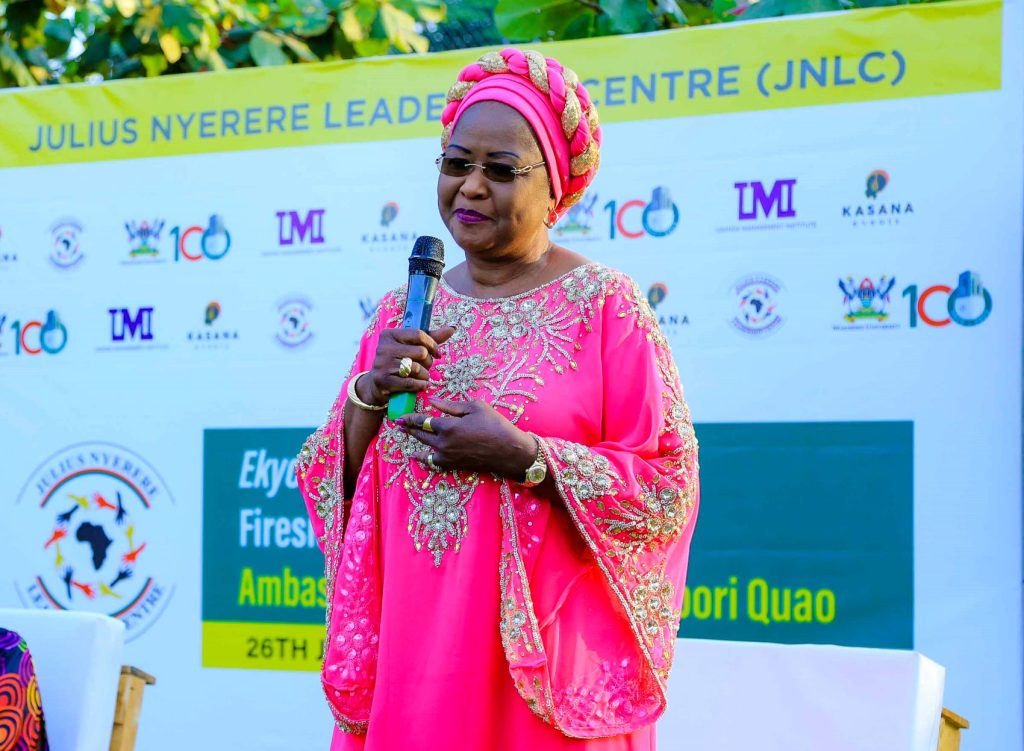
H.E Ambassador Dr. Arikana Chihombori Quao is a medical doctor, public speaker, educator, an entrepreneur and a staunch Pan African Activist who originates from Chivu, Zimbabwe, but based in the United States of America (USA). She served as the African Union representative to the United States of America (USA), 2017-2019.
“Brothers and sisters, let us try to understand that Africa is a tree of life. It reminds me about how this great African continent was and is the mother of humanity and life. Let us have a deep understanding of the issues of the root and not waste time to only understand the issues above the ground. Much as they matter too, the most fundamental issue is to understand the matters of the root on this African tree of life, because if we don’t, we will continue to fight about the issues above the ground of this African tree of life,” said the Ambassador.
Ambassador Arikana expressed the need for Africans to understand the root cause of Africa’s ailment, which would put the continent in a better position to strategise and push back against the Western and now the Eastern worlds which have systematically strategised to keep Africa in a position that leaves it prone to further exploitation.
“The question is, what happened to this beautiful, once vibrant African tree of life? We have to get back to the time when we were invaded by the West. They came and found an amazing continent and took away whatever they could. They wondered about how on earth they could conquer such a people. So, they decided to put in place certain fundamental root causes of African destruction. According to Dr. Arikana, they are the same people who set up the stage on how to destroy us systematically.”
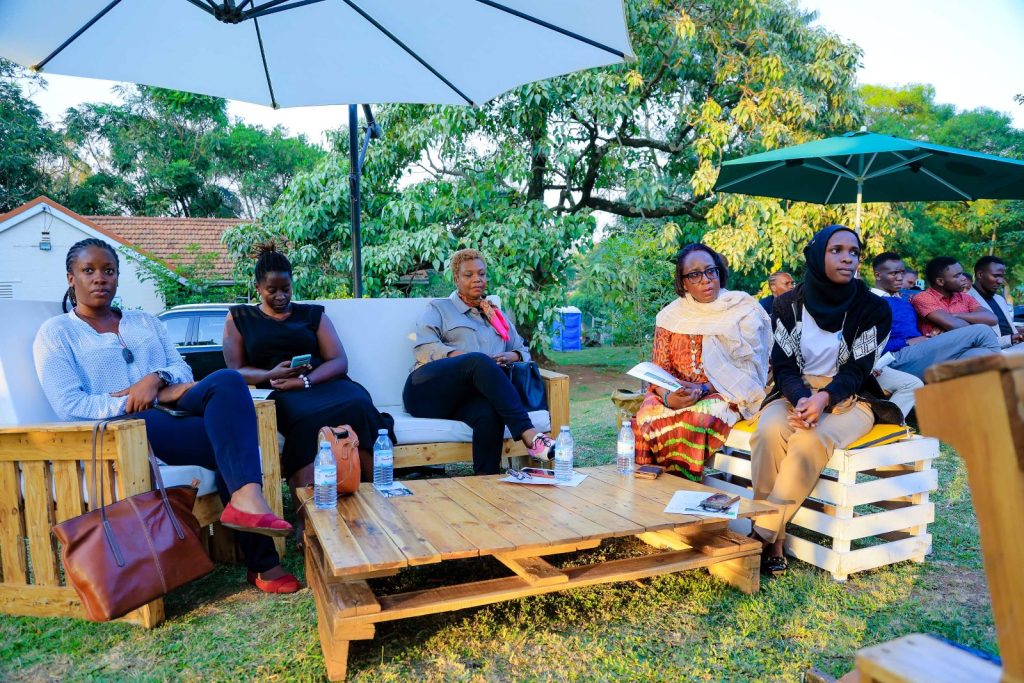
Describing how the West strategised to destroy and conquer Africa, she mentioned six (6) strategies that included religion, colonization, slavery, foreign aid, trade policy and multinationals. She revealed that the six (6) strategies were used to brainwash Africans, capture their minds and to make them feel inferior, in addition to dissolving the African culture. “When the missionaries come to Africa, they had a mission to brainwash Africans. They were instructed to teach the Africans how to read, but not to reason. They were trained to systematically abuse and mistreat Africans in a way that could easily lead them into submission. They used religion to brainwash us,” she explained.
Talking about the mindset, the Ambassador explained that Whites used slavery as a destructive tool and trained slave owners to use the slaves’ bodies to control their minds. She said that once you mistreat the body, the mind is affected and once you control the minds, you put them on an automatic pathway to self-destruction. She added that these days, Africans continue to suffer due to the legacy of colonialism. Most of them believe that they cannot perform as those who don’t look like them. This makes Africans to feel inferior, a belief and practice that has been going on for centuries. Ambassador Arikana disclosed that Whites and colonialists defeated us with our own minds, adding that Africans should remember that the battle for us to gain our economic liberation starts with the mind.
She pointed out that the battle for true liberation must go on and for that to happen, the Africans especially the youth must be empowered with knowledge, facts and the truth. She advocated for serious conversations with the image in the mirror and begin to understand that we feel the way we do because we were systematically put in that position. The Ambassador stressed that we all have the responsibility to recreate and rebuild Africa to where it once was when we ruled the world. This is a warfare that the entire African community should embrace.
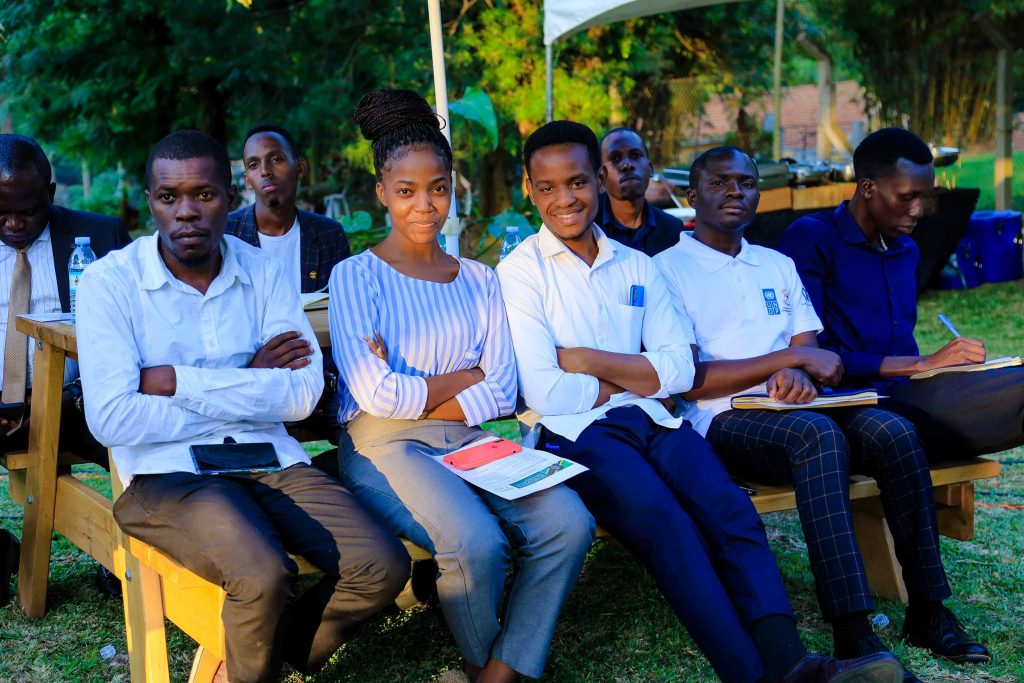
She reiterated that no one should ever tell us that we are not good enough. No one should let us feel inferior because we are the mothers and fathers of humanity. It is a fact that without the black man and woman, there would be no life and humanity. She stated that the Whites also realised that the gene for blackness is the only dominant gene, a finding that scared them the most.
“So, their fear of a black man and woman is real which proves that we are indestructible. Once we know all these facts, we shall never feel inferior. In fact, we should be standing tall and proclaim to the world who we are; the proud, beautiful, intelligent, sophisticated, highly adaptable and above all, totally indestructible,” the Ambassador firmly stated.
Ambassador Arikana spoke about the implications of the Berlin Conference that took place in Berlin, Germany, in 1884 on the African continent. She lectured about the outcome of the divisions on the continent of Africa that left many families, communities and kingdoms separated. She disclosed that these divisions explain the causes of some of Africa’s problems that are still in effect today. She then advocated for the reunification of Africa.
Sharing experiences and historical facts, Mr. Damian Courtland Cook, the Vice to the Ambassador, pointed out that the Whites used slavery to control Africans with a program they used to manipulate the mindset of young Africans. He disclosed to the student leaders and African youth at the Fireside Conversation (Ekyooto) that the Whites conducted a program within the plantations. “When new slaves would arrive at the plantation, they would take the strongest black man, tie him up and put him between two horses. They would take the females and line them up, preferably the pregnant ones or ones with young children. They would then rip this man apart to psychologically create a disturbing program in the mind of a child, they would then take all the men there and beat them half to death. These acts caused the mother to keep the child from becoming a dominant child and that was the intention of the program.”
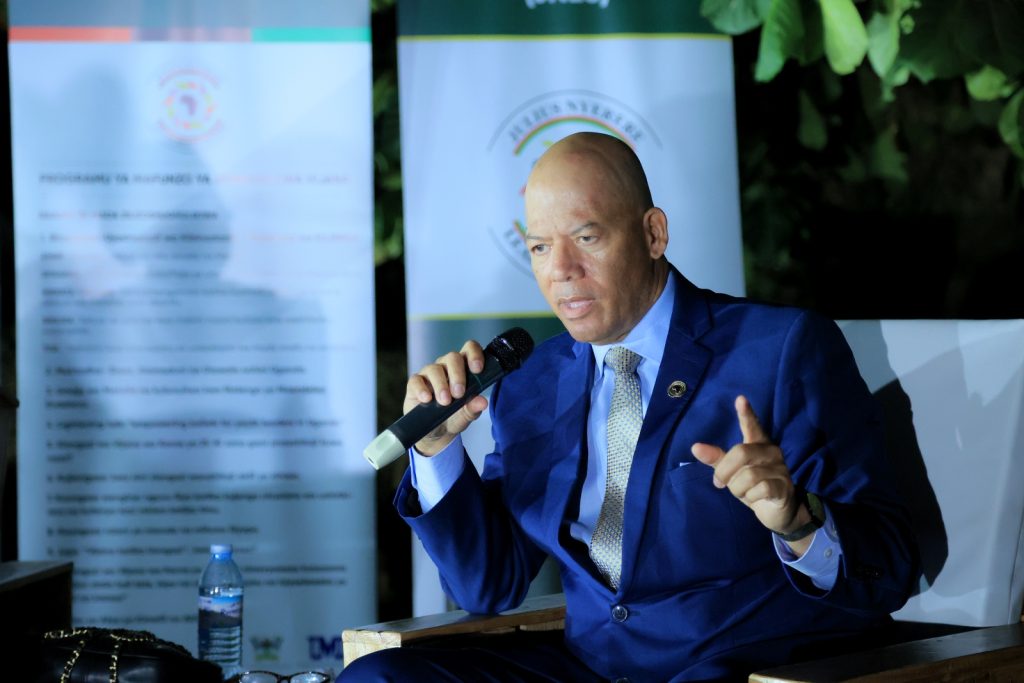
Having stayed in Africa especially in Zimbabwe, Mr. Damian Cook has known and seen the beauty of this great continent of Africa. He wondered why the West chose to portray a wrong image of Africa and whether they should still be called White. He said, “The image that Whites shed about Africa is not real, what is being given by the media is so different from the truth. The stories that were supposed to be told were not told to us about Africa, and the truth was never said. We only received images of young Africans found dirty and wandering around with flies, asking for donations. What was troubling was that the person asking for donations for these African children was a white person! If we say white, in our instincts we think of something pure, which is not the case here.”
Mr. Cook added that we have the brains and we should focus on bridging the technology gap for us to unite this continent. He said that the program is running in us, therefore, we must first recognize that there is a problem, and once we do so, then we must monitor it. He also advocated for the love and trust for each other.
“Why do we not trust one another? Why do we not trust our brothers and sisters, why do we not love each other, why are we so divided? We were programmed that way, it’s a program which is like a computer program. When it runs, it won’t stop unless you are aware of it, it will run, move you and you will think that it is your own fault. Mr. Cook said that these are thoughts that were planted in Africans.”
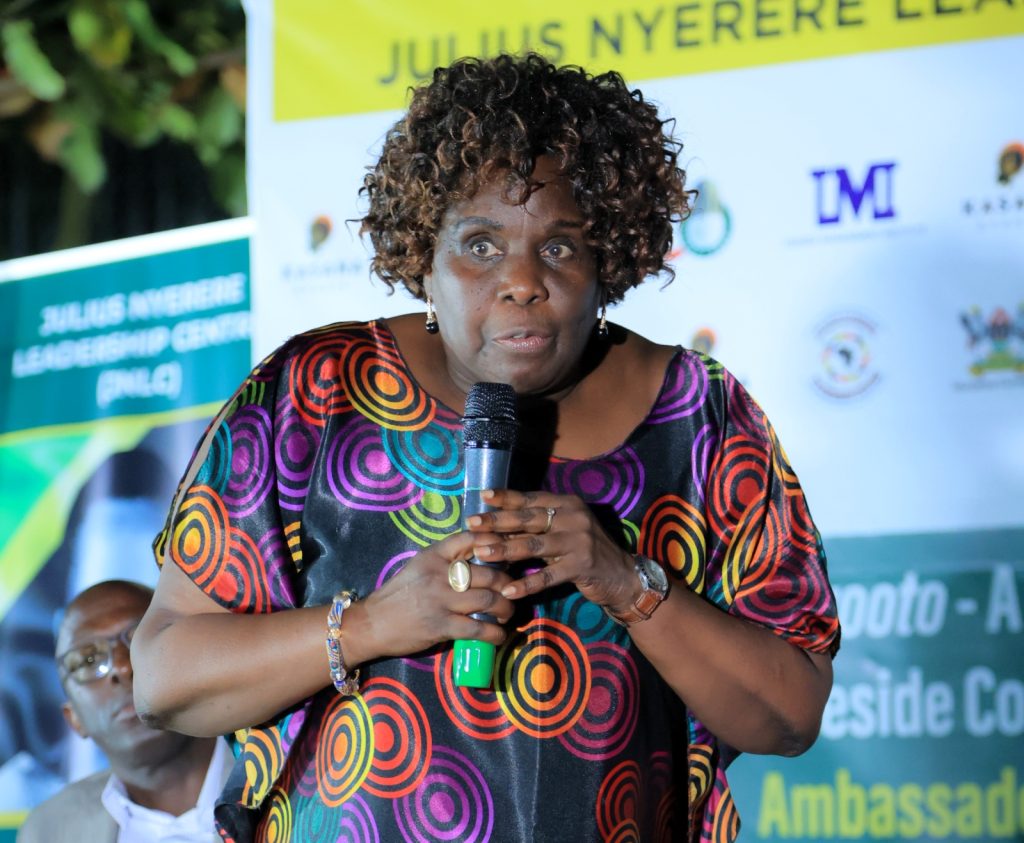
In her remarks, Dr. Suzie Nansozi Muwanga, the Executive Director, JNLC revealed that the Fireside conversations (Ekyooto) will be a great tool to bring together young and old people. Most importantly, the fireside conversations will awaken the minds of the youth to work on the image in the mirror. She advised the youth about the importance of self-discipline, the ability to hold themselves accountable and to always look out for their sister or brother to protect each other’s interests.
The Executive Director stated that “the mindset needs personal commitment. If you can commit yourself as a youth, a leader and an elder and always question and hold yourself accountable, there is no way you can go wrong, especially when you wrap it up with good discipline. All these happen to be in our good cultural norms of Africa,”
Professor Sarah Ssali, an Associate Professor at Makerere University and Dean-School of Women and Gender Studies and JNLC Board Member emphasised the need for Africans to play a part in the definition and re-definition of the narratives about Africa. She said that they have a role to play and the Julius Nyerere Leadership Centre (JNLC) provides a place and space they could sit and have these conversations, about what it means for us to be located on the continent at this particular time in history.
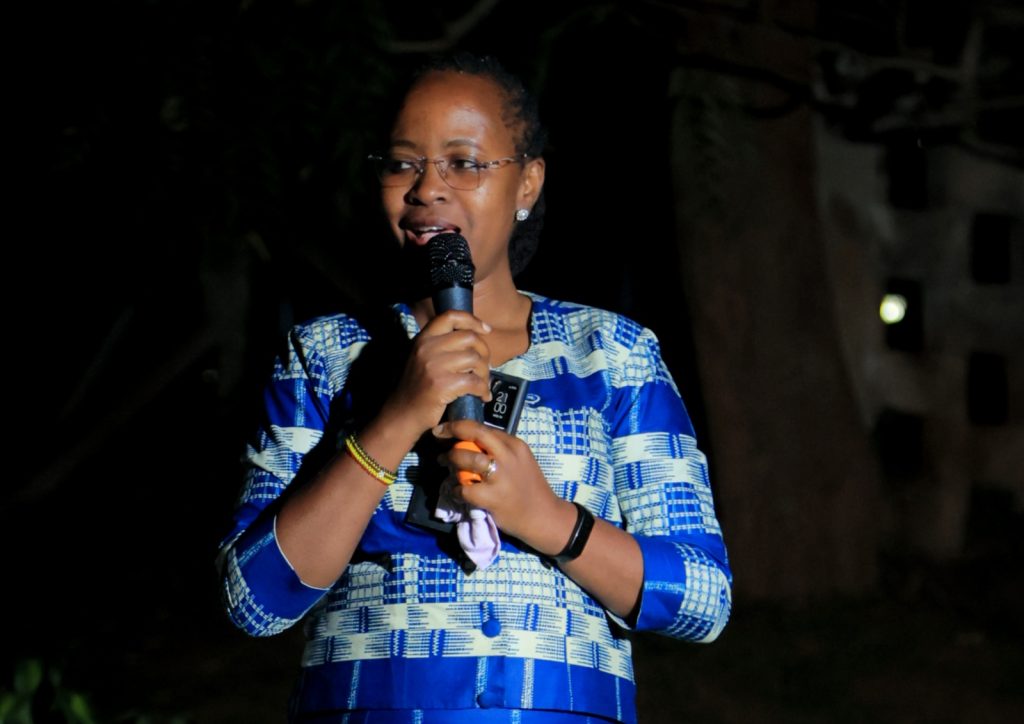
Associate Professor Sarah Ssali said “this is a time when we cannot afford to be complaisant, it is a time when we cannot afford to ignore and leave the definition and narratives to others. We are very happy that the JNLC came up with leadership and presidential leadership series.”
Associate Professor Sarah Ssali reiterated the fact that Africa is in an economic war and war of the mind that call for immediate action. She called upon the young and future leaders to stay focused.
She remarked that “much as there is a mind war that we experience individually, there is also a structural plan which shapes and determines what we experience as individuals. As we contemplate, the image in the mirror should not be forgotten.”
In addition, Mrs. Esteri Akandwanaho Muhoozi, a JNLC Board Member emphasised the need for Africans to understand their history and called upon the present generation to write the past roles and make better choices for a united and better sustaining African continent.
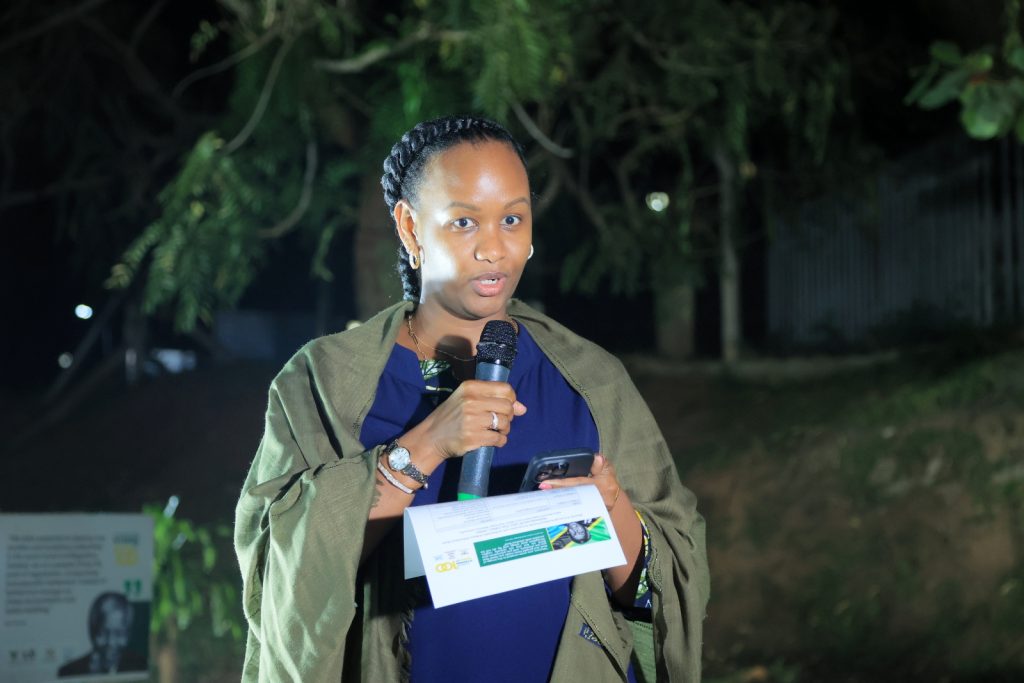
“Let us draw on the lessons learned here and those from our past leaders namely Mwalimu Julius Nyerere and we remain resolute in our commitment to make better choices for our continent and families,” she said. Mrs. Esteri Muhoozi noted that this generation has an opportunity and obligation to write these roles and forge a new path towards unity, prosperity and self-sustenance. The wounds of the past are healed; the choices we make now serve as beacons for hope tomorrow.
She added that strategic security plays a paramount role in this pursuit. She believes that if we invest our time and physical resources into Africa, we will be able to safeguard the continent. She articulated the need to be more organized as well as the need for more effort and purpose on our part to use our freedoms to make sense. “Strategic security is something that means that we should protect and ensure that we can secure what we have complete control over. We should then secure our communities which include our minds, children and resources against what we know are the internal and external threats.”
She thanked Dr. Arikana for her dedication to Africa’s progress and commitment to unity, her contribution towards the life journey to the Pan African cause and her inspiring words that ignited a call for action. She also thanked the young and everyday leaders for their devotion to Pan Africanism and raising issues that provided them with the campus to navigate the challenges that lied ahead of Africa. She commended the management and team of JNLC and the entire Makerere University leadership for the tireless work they do in promoting Pan Africanism.
Mr. Andrew Tumusiime, a founding board member of JNLC said he was really honoured to be part of the Fireside conversation (Ekyooto) with Ambassador Arikana. According to Mr. Tumusiime, the JNLC at Makerere University is the best “Pan African Centre currently active on the continent.”
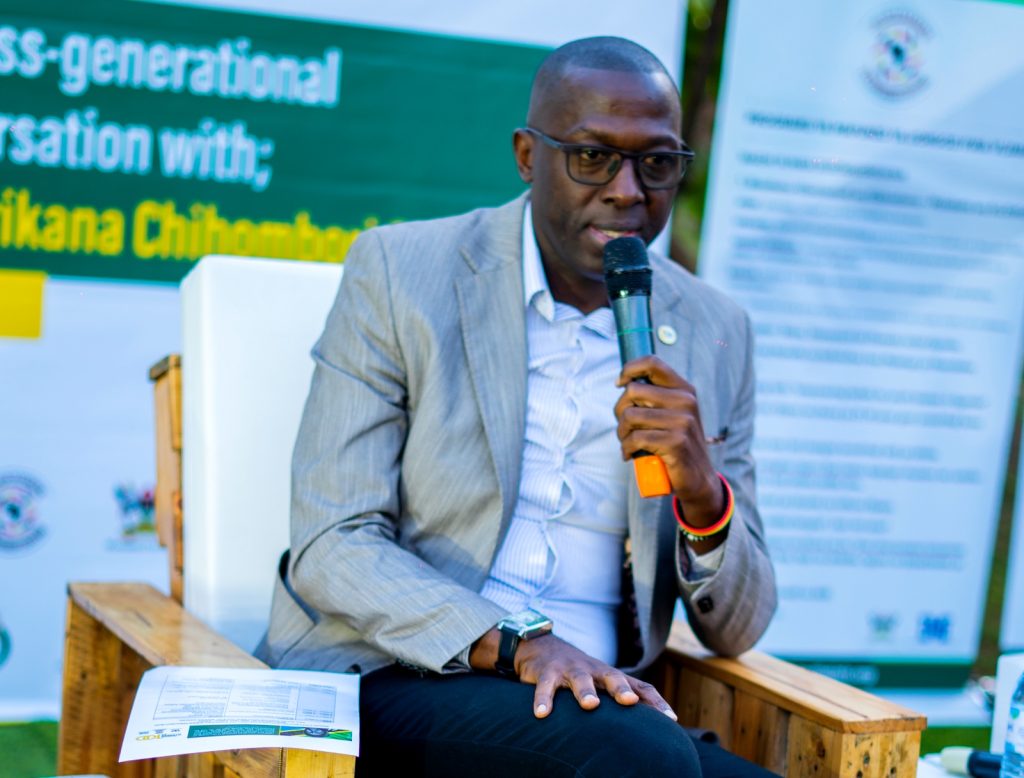
Mr. Tumusiime stated that gathering to talk and reflect on our culture, identity and effective development is a great move and if we need to store and have a strong foundation to tag along and not behind, there is need to move side by side with the women in Africa. In his view, when it comes to Pan African affairs, women have proved that they can stand to be so loyal more than men when it comes to building homes and nations. “Many women especially in West Africa fought the colonialists, some of whom are in history books and never spoken about, but they set a foundation for many of those countries that were liberated.”
In Africa, Mr. Tumusiime noted that culture was the only fortress that had remained. According to Mr. Tumusiime if we start with identifying ourselves as Africans who are brothers and sisters and agree that identity with one another is what’s going to be our next fortress, then that will be the best.” He noted with concern that “some parents do not even wish to give their children African names, but foreign names with hardly a meaning, yet for a long time we have preserved our culture through our names and our stories; it’s now high time we returned to our roots.
Focusing on being young, African and Free, Mr. Jacob Eyeru, the Chair of Uganda National Youth Council said there is more freedom among many young Africans today than ever before. There has never been a connected generation in Africa as they are. They have a privilege of the Internet where they could ably communicate to fellow youth near and far, but the choices of what they speak about, the agenda and direction of the conversations they hold are what still need to be worked on. In that regard, he urged his fellow young Africans to use their freedom to interact on the questions of the generational consequences for Africa.
“As young African leaders, let us challenge ourselves to be a driving force to unite us to the Africa we want. When we talk about agenda 2030, 2063, it is not for our fathers, but for us and our children. We are the future leaders of Africa, not our fathers. So, shall we be speaking of the same challenges that our fore fathers spoke about? Mr. Eyeru remarked that “we need to carry on our own generation in our youthfulness to make Africa a better continent for us and our children.”
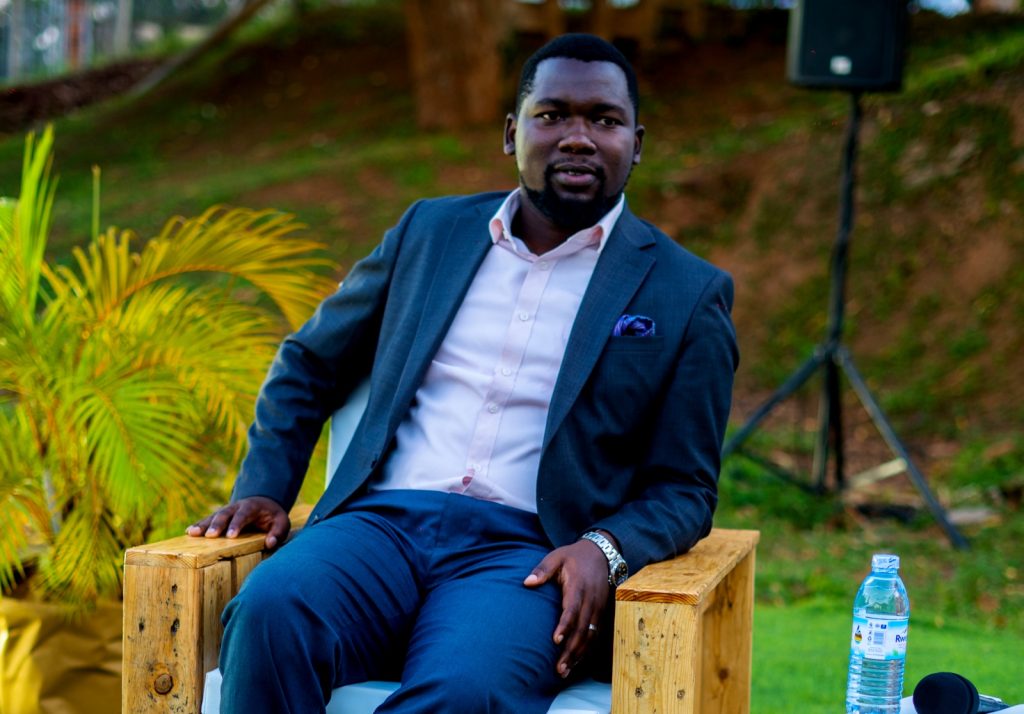
He added that young Africans can build a generational consensus to devote sometime away from their economic needs to the needs of the future of Africa in the global space. The globalisation agenda did not start today, it started way back, but is only to the effect that opportunities are brought to the countries that are already ahead of others. That is the globalisation journey and the kind of world of liberalisation that Mwalimu Julius Nyerere spoke about.
Contemplating on the struggles their fore fathers and mothers passed through and the contribution they made in a time when there was no technology like today, Mr. Eyeru felt his generation has not made good use of the freedom and opportunities they have to full capacity in creating a better Africa. He then wondered what the young people now use their freedom for and how they would take Africa to a position where it has to be. He said, that is where his interest has been in the entire term of his leadership.
“Our generation is not organising around the freedom that we have. Everything from around 1960 to about 1980 in Africa was a struggle and people were organising without telephones, internet and other technologies. When Uganda was getting its independence in 1962, the country had less than 100 graduates at University level, but these graduates were talking about what was happening in Apartheid South Africa and how Uganda must contribute. That’s Pan Africanism. Mr. Eyeru concluded that we should also emulate that in our generation, and the freedom to interact we have as young Africans must mean something for the future of our continent.”
H.E. Mariat Namiiro, the Vice Guild President of the 89th Students’ Guild at Makerere University and a vibrant Pan-Africanist revealed that the youth in Africa still lacked the sense of feeling the sense of Africanism in them. She disclosed the need to learn from those leaders who had gone through it and understood Pan Africanism as well as the need for African economic liberation. She said that Africans should start by accepting who they are.
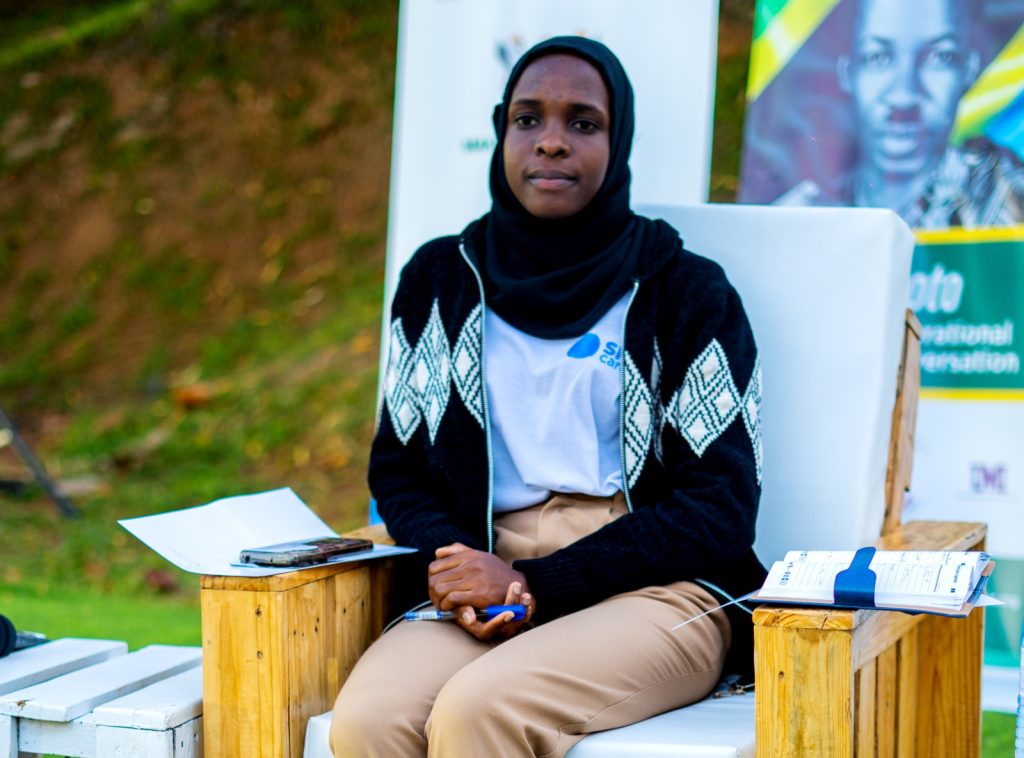
H.E. Namiiro said, “as a young leader, I can stand up for what I believe is right. As an African, I can stand up for Africa because I believe that Africans are the best. In this world of trying to grapple with economic and environment changes and resource challenges, I do believe that we as young leaders have a great role to play. We have a lot to do to ensure sustainable practices that can develop and spread within Africa.”
The Vice Guild President noted that the youth shouldn’t wait to be given authority and leadership positions to feel that they can change Africa to what we want it to be. She thus called upon fellow youth leaders to embrace the mantle of everyday leadership with determination and hope together. This was because she believed that they could create a world where self-sustenance and economic liberation are not just an aspiration to them, but a reality in Africa like how our fore fathers and mothers wanted it to be.
According to Hon. Moses Jok Aluong, an international student from South Sudan and the Minister for International Students in the 89th Students’ Guild at Makerere University, the African youth can leverage their identity with other Africans to better position the continent. Having come from a country with a diversity of identities, 64 tribes in total, he realised that the way they make use of that opportunity as Africans is not the best. They use that diversity of identity to foster vices such as corruption, nepotism and favoritism which he thinks should change.
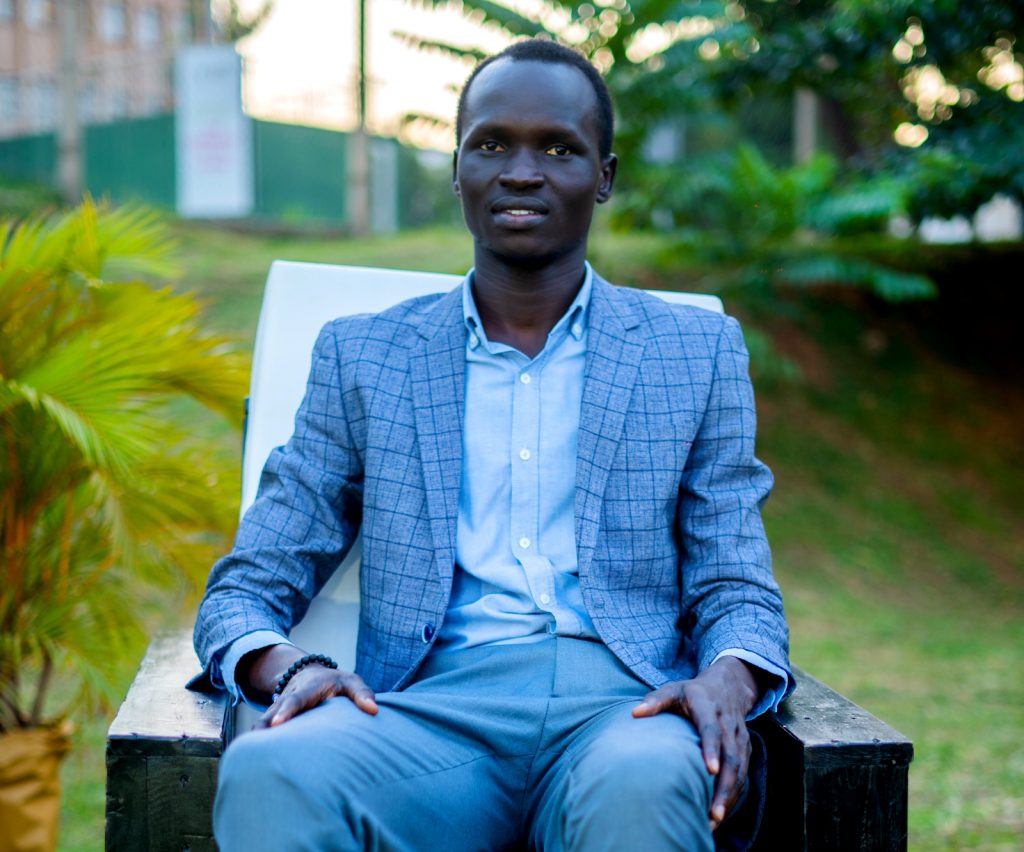
Hon. Jok said that the African youth should understand that despite the diversity of identity, they have a common background. In his opinion, they can use their history and identify to contribute to self-sustenance in Africa and to rebrand and reshape the narrative of the African Youth, “If I belong to one ethnicity, it does not mean that we are different. It should be more of how we can make good use of this, having come from different backgrounds to better tell our common story as Africans. I believe we as the youth leaders can change that.”
He advised that the youth should embrace and leverage on the available opportunities namely the Internet and other technologies to constructively position themselves. He stressed the point that the youths from other spheres of the world such as China who are making research every day to come up with new inventions are not more intelligent than them. He implored his fellow youth to make use of what they have to better reposition Africa than going with the flow of how the West defines us.
“We have to better position ourselves to make good use of available opportunities to retell our story. We can also emulate countries that have made it yet they were once in the same position with us. These people decided to redefine themselves. We can redefine ourselves by making use of what we have because we have it all. What we need is to put it to good use,” said Hon. Jok.
Wrapping up the Fireside conversation (Ekyooto), the JNLC Executive Director, Dr. Nansozi Muwanga thanked H.E. Ambassador Arikana Chihombori Quao for the wonderful submission to the youth and young leaders as well as her exemplary role as a Pan Africanist. She also commended Makerere University for providing the Centre with the physical space as well as the Uganda Management Institute (UMI) for their consistent support and partnership. Dr. Muwanga equally thanked the young leaders present for their active participation in the Ekyooto – the Fireside conversation.
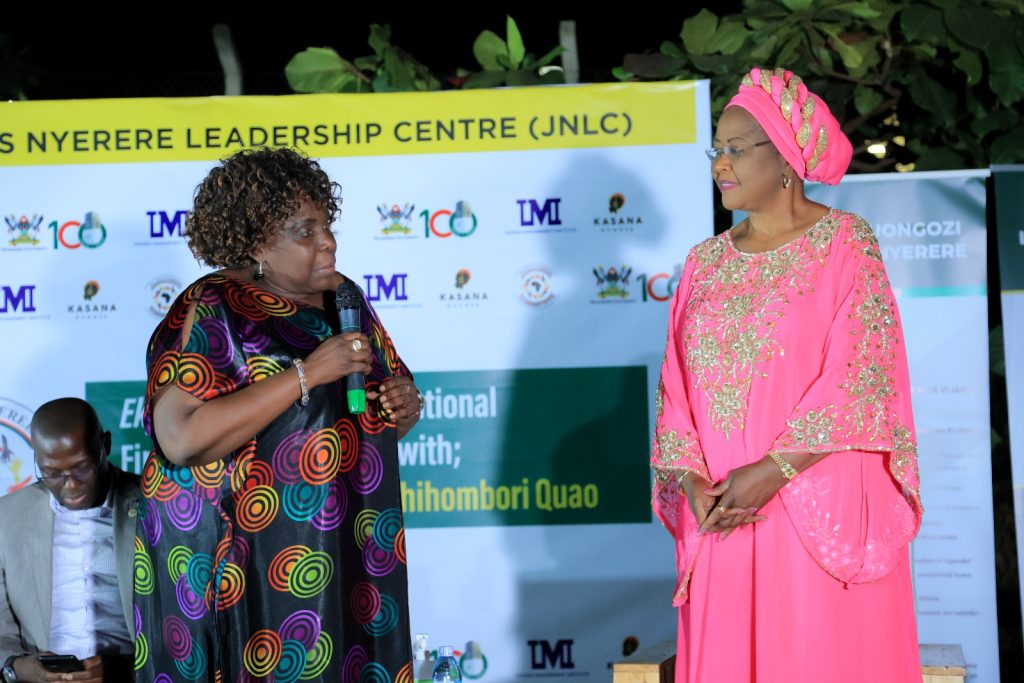
Ambassador Arikana Chihombori expressed her sincere gratitude for the invitation to Makerere University to speak to the young bright minds and the future African leaders. She believed that the cross-generational conversation presented her with a platform to fulfill her responsibility as an elder by teaching the youth and young leaders the truth.
The Ambassador gifted JNLC with copies of one of her famous books titled “Africa 101: The Wake Up Call.” The book is about the “hunters” and the “hunted.” The hunters are Africa’s exploiters, slavers, colonizers, and neo-colonisers, and the hunted are the African people who have survived against severe odds. In this book, Ambassador Arikana confirms that the hunt is still ongoing and calls on Africans and people of African descent all over the world to rise up in defense of Africa-our beloved continent.
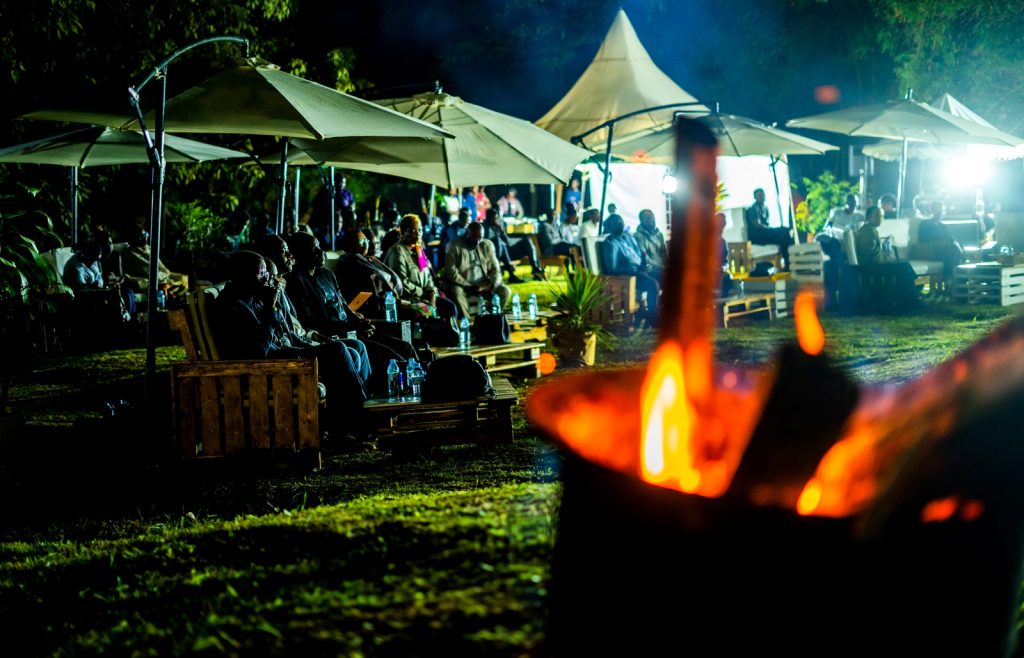
The front cover states, “Wake up from the slumber of 400 years, free yourself from the mental shackles of colonialisation and slavery, black lives matter, I can’t breathe, get off my neck.” This book contains the naked truth that our children must read. Every chapter is a subject matter. It will make you think deep about what is really going on in Africa. Ambassador Arikana said: “So, this is my gift to the Julius Nyerere Leadership Centre (JNLC).”
You may like
-


CAES Presents Overall Best Performing Student in the Sciences & a Record 28 PhDs at the 76th Graduation Ceremony
-


Mak hosts First African Symposium on Natural Capital Accounting and Climate-Sensitive Macroeconomic Modelling
-
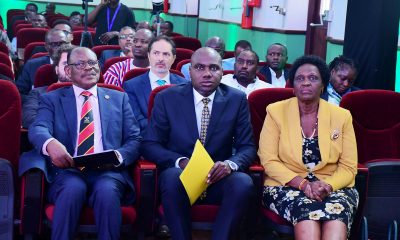

First African Symposium underscores the role of the Centre of Excellence for Africa Climate-Sensitive Macroeconomic Modelling
-


Makerere Launches Scholarly Guide, Calls for Increased Research, Publication and Innovation in Africa
-


For Youth by Youth – Call for Second Cohort Applications
-


How Jimmy Osuret Turned Childhood Trauma into Evidence for Safer School Crossings

It is with great pleasure that I welcome you to this edition of Mak News Magazine, a publication that continues to chronicle Makerere University’s journey as a centre of academic excellence, innovation, and societal transformation.
The stories featured in this issue vividly demonstrate Makerere’s unwavering commitment to addressing national, regional, and global challenges through research, partnerships, and people-centred solutions. They reflect a university that is deeply engaged with society, one that applies knowledge not only to advance scholarship, but also to improve lives.
A recurring theme in this edition is innovation for resilience and inclusion. From the College of Agricultural and Environmental Sciences’ Healthy Soy Initiative combating child malnutrition amid climate change, to the cutting-edge work of CEDAT’s Team Green Minds integrating IoT into agriculture, Makerere continues to harness science and technology to respond to pressing development needs. Equally inspiring is the College of Natural Sciences’ success in securing international funding to scale up fish processing technologies, with a deliberate focus on empowering women and strengthening livelihoods.
This issue also highlights Makerere’s growing role in advancing health and wellbeing. The launch of the Early Intervention Psychiatry Services Clinic at Makerere University Hospital marks an important step in strengthening mental health services, while the Hospital’s transformation from a modest sickbay into a centre of excellence stands as a testament to decades of strategic investment, dedication, and service to the nation.
Our commitment to education access and global engagement is equally evident. Strategic partnerships, such as that between the College of Education and External Studies and the Uganda Vocational and Technical Assessment Board, are expanding pathways to quality education. The establishment of the first-ever United States Studies Centre in the Great Lakes Region positions Makerere as a hub for dialogue, research, and policy engagement on global affairs. We also celebrate our vibrant international community, with graduates drawn from 67 nationalities—affirming Makerere’s status as a truly global university.
This edition further showcases initiatives that ensure long-term institutional sustainability, including the launch of the CoCIS Endowment Fund, infrastructure developments such as the modern hostel at Buyana Farm, and transformative programmes supported by the Mastercard Foundation that continue to empower young people across the continent.
As you read through these pages, I invite you to reflect on the collective effort of our students, staff, alumni, partners, and supporters whose contributions make these achievements possible. Together, we continue to shape Makerere University as a place where knowledge serves humanity.
I wish you an engaging and inspiring read.
Prof. Barnabas Nawangwe
VICE CHANCELLOR

The Board Chairperson of the Makerere University Endowment Fund (MakEF), Dr. Margaret Blick Kigozi, has urged graduands in Health and Life Sciences to uphold professional ethics and serve humanity with diligence and compassion.
Her appeal came during the passing out of graduates from the College of Natural Sciences (CoNAS), the College of Veterinary Medicine, Animal Resources and Bio-Security (CoVAB), the College of Health Sciences (CHS) and the School of Public Health (SPH) on Day Two of the 76th Graduation Ceremony of Makerere University.
“Class of 2026, you are now part of the Makerere legacy. Wherever you go clinics, laboratories, farms, boardrooms, or classrooms, you carry this institution with you. Serve your patients with skill and compassion. Care for animals and communities responsibly. Question boldly and keep learning,” Dr Kigozi, said.
Delivering the commencement address, Dr. Kigozi lauded the graduates for their dedication to careers that directly impact lives and communities. She encouraged them to use their knowledge generously and exercise their power gently.
“Your education has trained you to ask better questions. Your humanity must guide the answers. Never forget that behind every chart, every case, every animal, every experiment, there is life. And life deserves care, patience, and dignity. Give every person you come in contact with care, patience and dignity,” Dr Kigozi, noted.
As the graduates embark on their professional journeys, Dr. Kigozi emphasized the importance of cultivating basic business acumen and financial literacy to ensure sustainability in their work.

“You do not need to become accountants but you must be able to read the essentials: understand simple financial statements, budgets and key metrics so you can judge whether a clinic, lab, or program is sustainable. You are encouraged to start your business. There are numerous investment opportunities in your areas of training. You can provide services to our people and create jobs,” Dr Kigozi, said.
She shared candidly how, when she first stepped into leadership, she realised she did not understand balance sheets or budgets well enough. So, she returned to Makerere for short courses to strengthen herself.
“A well-run Hospital, clinic or lab delivers better outcomes, attracts staff, and secures funding. Business savvy is not only about profit, it’s about sustainability and the freedom to serve ethically and effectively. Carry clinical skill with business sense so your work endures and grows,” Dr. Kigozi, noted.
Quoting renowned writer and producer Shonda Rhimes, creator of Grey’s Anatomy, who once reflected that succeeding in one area of life can sometimes mean falling short in another, Dr. Kigozi encouraged women graduates to intentionally balance professional ambition with family responsibilities.
“When one area thrives, another is often under strain. When Navio was graduating from school I had to manage the Presidential Investor Round Table on the same day as Executive Director Uganda Investment Authority. I chose my job and delegated his siblings to attend Navios graduation. I learnt from this. I choose family always after that thing you achieve once and keep forever,” Dr Kigozi, said.
In his speech, the Prof Barnabas Nawangwe, the Vice Chancellor, informed the congregation that Makerere’s ranking on all university ranking platforms has remained stable, placing Makerere among the top 10 African universities and within the top 4.5% globally.
“In the Times Higher Education global ranking, Makerere University made a formidable jump from the 1200-1500 bracket to the 800-1000 bracket. This was no mean achievement and I congratulate all members of the Makerere Community on this stellar performance,” Prof Nawangwe, said.
General
Graduation marks the next phase of accountability, graduates told
Published
5 days agoon
February 25, 2026
“A degree is not a finish line. Graduation is not the end of learning, It is the beginning of accountability,” Prof. Nicholas Ozor, the Executive Director of the African Technology Policy Studies Network Nairobi, Kenya (ATPS), said.
Delivering a keynote address under the theme ‘Knowledge with purpose’, during Makerere University’s 76th graduation ceremony on Tuesday 24th February, Prof Ozor, challenged graduates to see their degrees not as status symbols, but as instruments of responsibility.
In his speech, he painted a candid picture of the world the graduates are stepping into, one marked by climate change, technological disruption, inequality, food insecurity and the rapid spread of misinformation. Yet rather than framing these challenges as obstacles, he described them as opportunities for purposeful leadership.
“Into this world, you step, armed with knowledge, credentials, and potential. Your degrees do not make you better than others. They make you responsible for others,” Prof Ozor, said.
Addressing graduands from College of Agricultural and Environmental Sciences (CAES)
College of Computing and Information Sciences (CoCIS), College of Education and External Studies (CEES) and School of Law (SoL), Prof. Ozor tailored his message to each field of study.
To graduates of the School of Law, he described the legal profession as a moral calling, urging them to use the law to protect the vulnerable and uphold justice with courage.
“Uganda, Africa, and the world do not need lawyers who only know how to argue. They need lawyers who know why they argue. Use the law to protect the weak, not intimidate them. Use your knowledge to defend justice, not delay it. Let integrity define your reputation not merely your résumé,” Prof Ozor, said.
For graduands who might feel that shortcuts will be tempting and silence will feel safer than truth, Prof. Ozor reminded them that justice does not need clever people, but courageous ones.
To the College of Education and External Studies, he underscored the transformative power of teachers, reminding them that classrooms shape nations long before policies do.
“Every nation rises and falls on the quality of its teachers. Never underestimate the power of a classroom. Teach not only for examinations, but for understanding. Teach not only content, but character. Teach learners how to think not what to think. Education is quiet work but its impact echoes across generations,” Prof Ozor, noted.
He called upon graduands from the College of Computing and Information Sciences, to use technology to solve African problems, not merely to imitate foreign solutions.
“Technology is powerful, but it is not neutral. Every line of code carries values. Every system you design affects real lives. Build for inclusion. Build for accessibility. Build for truth. Do not let innovation outrun ethics. The future will not belong to those who know the most technology, but to those who use it wisely,” He noted.
During the ceremony, Prof Ozor announced that the African Technology Policy Studies Network is offering PhD scholarships and postdoctoral fellowships in Artificial Intelligence, inviting deeper collaboration with Makerere.
For graduates of the College of Agricultural and Environmental Sciences, he highlighted their critical role at the intersection of sustainability and survival, calling on them to blend indigenous knowledge with scientific innovation to secure Africa’s food systems and protect its ecosystems.
In closing, he reminded graduands that their integrity will open doors their degrees cannot, their humility will teach them lessons success never will, and their resilience will matter more than their grades.
Five principles to be remembered:
- Embrace lifelong learning. The world changes too fast for static knowledge.
- Choose purpose over comfort. Impact matters more than income.
- Build character before career. Skills get you hired; character sustains you.
- Serve something larger than yourself. Give back to your communities and your country.
- Believe in Africa, and act. Do not wait for solutions from elsewhere. Be the solution.
Trending
-

 Humanities & Social Sciences7 days ago
Humanities & Social Sciences7 days agoMeet Najjuka Whitney, The Girl Who Missed Law and Found Her Voice
-

 General6 days ago
General6 days ago76th Graduation Highlights
-

 Health2 weeks ago
Health2 weeks agoUganda has until 2030 to end Open Defecation as Ntaro’s PhD Examines Kabale’s Progress
-

 Agriculture & Environment1 week ago
Agriculture & Environment1 week agoUganda Martyrs Namugongo Students Turn Organic Waste into Soap in an Innovative School Project on Sustainable Waste Management
-

 General2 weeks ago
General2 weeks agoMastercard Foundation Scholars embrace and honour their rich cultural diversity
